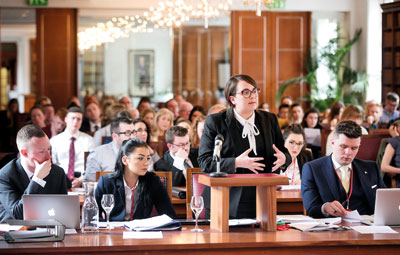The role of moot court experience in legal education
View(s):
From time to time we have come cross newspaper items and photographs of teams from Law Schools that have won ‘Moot Competitions’. However, it is rarely that we give thought to the role moot courts play in legal education. The University of Ulster’s LL.B. programme attaches significant importance to moot court experience as part of the aims of developing research and advocacy skills and the ability to inter-act with colleagues and those who play the role of a Judge at moot court events.
A ‘moot trial’ is different from a ‘mock trial’. The latter represents more or less a courtroom trial where evidence is led, witnesses, cross examined and the Jury is addressed by the lawyer for the prosecution and the defence. A ‘moot court’, on the other hand, is more like what happens when an appeal is heard from a judgement or order from a lower court.
 A typical ‘moot court’ would have one or three Judges (legal luminaries or persons functioning as Judges in real life), two students each for the Appellant and the Respondent and sometimes a Registrar or Court Clerk. This terminology may differ slightly from one jurisdiction to another.
A typical ‘moot court’ would have one or three Judges (legal luminaries or persons functioning as Judges in real life), two students each for the Appellant and the Respondent and sometimes a Registrar or Court Clerk. This terminology may differ slightly from one jurisdiction to another.
The case note will be based on a given set of facts and the judgement or order from the lower court from which the appeal has been lodged. The counsel for both sides will have to undertake research to present their respective case. In some instances, the note will contain a list of the relevant cases; in other instances the students would be left to do their research. Typically, each side will have 10 to 15 minutes to initially present their case. The Judge can interrupt the Counsel at any time to seek clarification. Sometimes, this would mean that the Counsel would have to deviate from the prepared plan of submissions to answer the Judge’s question. For this reason, reading out a prepared text by Counsel is highly discouraged. Additionally, the more confidence can be developed by addressing the Court without reading out the prepared text.
In most instances, only a few students in any batch volunteer to participate in a ‘moot court’. Some students tend to be shy; others, simply do not want to go through the hassle of looking up references to be cited. It is important to note that in drafting the case note, the writer will ensure that there is not even a single case exactly on point. It is rather by analogy that relevant cases can be cited and the principles in those cases sought to be applied to the facts of the given situation.
At Nawaloka College of Higher Studies where law students will spend their first two years, every endeavour will be made to ensure that ‘moot court’ experience becomes integrated into the teaching method from the outset and all students will gain an opportunity to participate. This would an enriching experience as they proceed to Ulster for the third year.
-Dr. Dayanath
Jayasuriya P.C.


